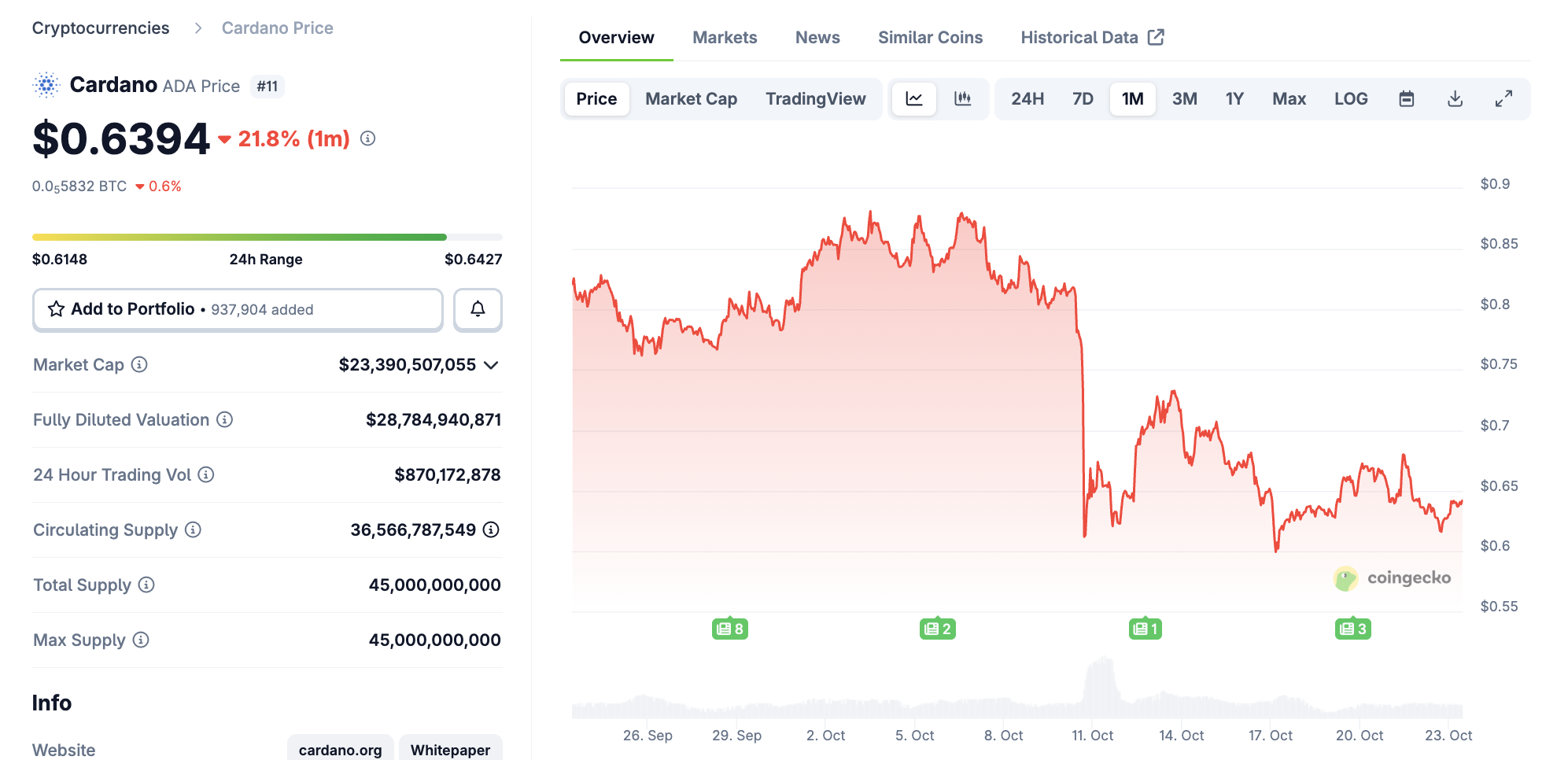Cardano Achieves Several Milestone This Month, But Price Remains Depressed
Cardano’s price has stalled even as on-chain activity and staking surge. Analysts point to whale sell-offs, but ADA’s fundamentals and retail backing remain solid, suggesting steady long-term potential.
Cardano’s price has been stagnating for several weeks, but the network has strong retail support. ADA reached 115 million on-chain transactions this week, and the Cardano network avoided any damage from the AWS outages.
There’s still a lot of community support, as evidenced by Cardano’s market cap and high rate of staked tokens. Whale activity may be blunting its forward momentum, but there could be other explanations.
Why is Cardano’s Price Lagging?
Cardano attracts a lot of community hype, and for good reason. In the last few days, the proof-of-stake blockchain network has reached a lot of milestones.
Although ADA’s token price hasn’t reacted much, on-chain analysts noted that Cardano’s user activity is through the roof.
MILESTONE: Cardano $ADA has surpassed 115,000,000 transactions on mainnet.Real transactions from real users.You can view them all on Cexplorer 😎
— Cexplorer.io 🅰️ (@cexplorer_io) October 23, 2025
This activity can be measured in several key ways beyond on-chain transactions. Cardano holders are staking 21.8 billion ADA tokens, which is 57% of the total supply.
In other words, the community has a strong faith in the altcoin, hoping to earn passive income from Cardano in addition to benefiting from price increases.
Furthermore, the recent AWS outages showed that the blockchain has real decentralization. Although major industry leaders like Ethereum and Coinbase saw persistent problems during this period, highlighting their centralized infrastructure, Cardano remained strong:
Congrats Cardano. You passed the test!
— Ben ✈️🇰🇷🇻🇳🇸🇬🇯🇵 (@benohanlon) October 21, 2025
Despite these advantages, we have to talk about the elephant in the room. Although Cardano’s market cap has shown remarkably consistent competitiveness over the last several years, its price has been lagging behind for weeks.
 Cardano Price Performance. Source:
CoinGecko
Cardano Price Performance. Source:
CoinGecko
A Case for Whale Activity
A few competing theories have arisen to explain Cardano’s price doldrums. For one thing, large holders can be a mixed bag. Although ADA whales backed the token despite bearish signals, they’ve recently initiated massive sales to block price rebounds. Whenever Cardano gets some forward momentum, rampant profit-taking subsequently blunts it.
Overall, this seems like the most likely hypothesis. Similar behavior has popped up several times in recent months, whereas other explanations involve macroeconomic concerns and other factors.
ADA has also shown some signs of weakening retail interest, even though on-chain transactions and staked tokens remain strong. Ultimately, we can only narrativize the data we have, but market narratives are still crucially important.
Whatever is causing Cardano’s ongoing price woes, the token still has strong support and fundamentals. Although it’s impossible to predict a full rebound, ADA still has strong community support to capitalize on any near-term bullish cycle.
Disclaimer: The content of this article solely reflects the author's opinion and does not represent the platform in any capacity. This article is not intended to serve as a reference for making investment decisions.
You may also like
Bitcoin Latest Updates: Investors Shift Away from Gold Amid Improved Trade Relations, Risk Appetite Rises While Bitcoin ETFs Lag Behind
- Gold fell below $4,000 as U.S.-China trade tensions eased, reducing demand for safe-haven assets after a framework agreement in Malaysia. - Bitcoin dropped 3.5% to $108,000 but rebounded near $115,000, while ETF inflows lagged behind gold's outflows amid divergent investor behavior. - JPMorgan forecasts gold to average $5,055 by 2026, while Bitcoin's ETF inflows and ETF market momentum show uneven growth despite regulatory challenges. - Technical analysis shows gold's bearish RSI and Bitcoin's $115,000 s

Breaking Down Barriers in Blockchain: Brevis Handles 130 Million zk Proofs Each Month
- Brevis, a Web3 platform, processes 130M monthly zero-knowledge proofs via its zk coprocessor network, addressing blockchain scalability and interoperability challenges. - Its architecture offloads computation off-chain while verifying on-chain, reducing gas costs and enabling cross-ecosystem trustless logic through "chain fence" elimination. - With 97K+ users, 30+ global partners, and optimized parallel processing, Brevis aims to establish a foundational zk data layer for real-time smart contract verific

AI's Dilemma in Education: Revolutionizing Learning or Widening Gaps?

Tech Industry Relieved as U.S.-China Agreement Temporarily Halts Rare Earth Export Restrictions
- U.S. and China agree to a one-year trade framework suspending key tariffs and rare earth export controls to ease tensions. - The deal avoids a 100% U.S. tariff on Chinese goods and delays China's rare earth restrictions critical to tech and defense sectors. - China resumes soybean purchases, benefiting U.S. farmers, while U.S. reduces fentanyl-related tariffs from 20% to 10%. - Success hinges on China's enforcement of rare earth policies and U.S. adherence to export controls, per analysts.

